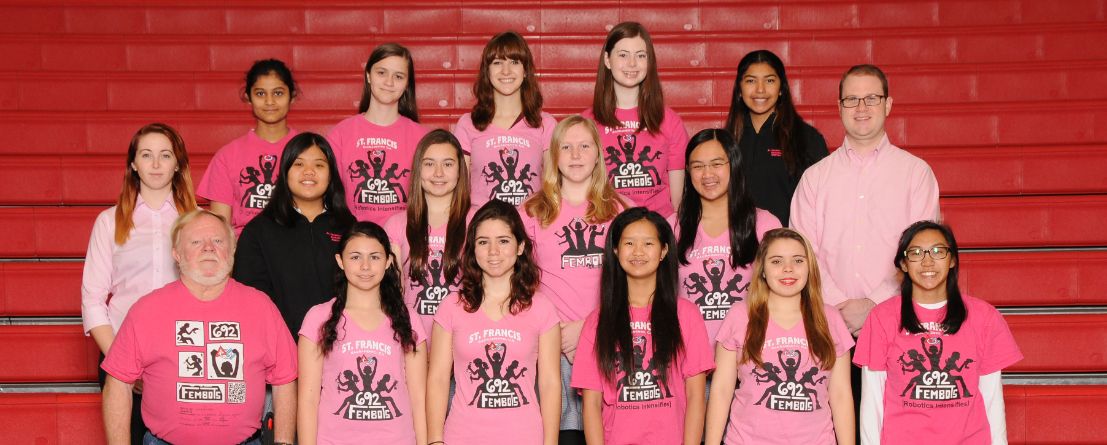

“With the FIRST competition, students’ knowledge is tied to something tangible.”Mentor: Peter Strawn
Q: What is your background and how did you become a Mentor to this team?
PS: I was an English teacher for seven years and transitioned last year into a new position as Academic Technology Specialist at St. Francis. Part of my job is developing a STEM program on campus and it made sense for me to become coach of the Robotics team. We have strong mentor support from parents who manage the technical aspects of the team, so my role as coach involves broader project management.
Q: What do you see as the main learning experiences students gain from the FIRST program?
PS: Aside from the technical knowledge (which is important), I think students learn how to solve problems and design solutions that have real world implications. With the FIRST competition, students’ knowledge is tied to something tangible. Our robot is only functional and successful to the extent that students can collaborate, communicate, and create as a team. Additionally, the strategizing that goes into playing the game itself helps students develop critical thinking skills. Most importantly, something unique to our demographic at an all-girls school, students here learn that careers in STEM are as much for them as they are for anyone else.
Q: Do you see STEM education getting stronger through programs like FIRST?
PS: Without a doubt! Seeing the live-stream kickoff event this year for the first time was all I needed to be convinced. Dean Kamen (founder of FIRST) emphasizes that, in many ways, FIRST is about learning how to learn, and in that moment, I got it. The passion and excitement of all the students is evidence of its success. If a program can get students to want to learn, especially something as challenging as building a robot as a team, then it is clearly moving things in the right direction.

Q: What is the most challenging aspect of being a Mentor and how do you encourage others to take on this role at other schools?
PS: As someone brand new to FIRST, the biggest challenge has been understanding all the different aspects that make up a season. I’ve been fortunate to step into a team that has a 15-year history, so there is institutional knowledge to draw from. My advice would be to attend an event or two. That is probably all the encouragement necessary to take on this role. The passion of students is the strongest evidence for choosing FIRST.
Q: Why is it important for companies and individuals to support FIRST?
PS: On one level, some, if not most, schools may not have the knowledge, resources, supplies, and/or facilities needed to build a robot when starting out. That is a more pragmatic reason. Yet, even as teams get established, support for FIRST is an investment in the development of passion in students for things they may have never dreamed of doing before. It is an investment in not just the technical knowledge and career readiness of students but also the collaborative, open-minded, creative thinking that is necessary for any student’s mind to mature. Ultimately, there is no other reason for a program to exist in schools than that it is best for students, and because FIRST does things for STEM education that no other programs do, it is worth the investment.

